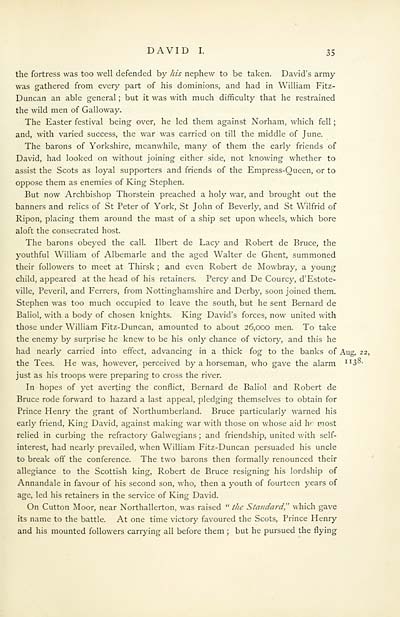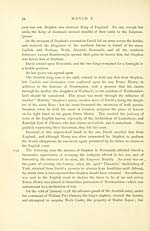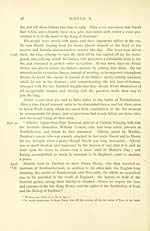Family records of the Bruces and the Cumyns
(47) Page 35
Download files
Complete book:
Individual page:
Thumbnail gallery: Grid view | List view

DAVID I. 35
the fortress was too well defended by his nephew to be taken. David's army-
was gathered from every part of his dominions, and had in William Fitz-
Duncan an able general ; but it was with much difficulty that he restrained
the wild men of Galloway.
The Easter festival being over, he led them against Norham, which fell ;
and, with varied success, the war was carried on till the middle of June.
The barons of Yorkshire, meanwhile, many of them the early friends of
David, had looked on without joining either side, not knowing whether to
assist the Scots as loyal supporters and friends of the Empress-Queen, or to
oppose them as enemies of King Stephen.
But now Archbishop Thorstein preached a holy war, and brought out the
banners and relics of St Peter of York, St John of Beverly, and St Wilfrid of
Ripon, placing them around the mast of a ship set upon wheels, which bore
aloft the consecrated host.
The barons obeyed the call. Ilbert de Lacy and Robert de Bruce, the
youthful William of Albemarle and the aged Walter de Ghent, summoned
their followers to meet at Thirsk ; and even Robert de Mowbray, a young
child, appeared at the head of his retainers. Percy and De Courcy, d'Estote-
ville, Peveril, and Ferrers, from Nottinghamshire and Derby, soon joined them.
Stephen was too much occupied to leave the south, but he sent Bernard de
Baliol, with a body of chosen knights. King David's forces, now united with
those under William Fitz-Duncan, amounted to about 26,000 men. To take
the enemy by surprise he knew to be his only chance of victory, and this he
had nearly carried into effect, advancing in a thick fog to the banks of Aug. 22,
the Tees. He was, however, perceived by a horseman, who gave the alarm IJ 3<>-
just as his troops were preparing to cross the river.
In hopes of yet averting the conflict, Bernard de Baliol and Robert de
Bruce rode forward to hazard a last appeal, pledging themselves to obtain for
Prince Henry the grant of Northumberland. Bruce particularly warned his
early friend, King David, against making war with those on whose aid \v most
relied in curbing the refractory Galwegians ; and friendship, united with self-
interest, had nearly prevailed, when William Fitz-Duncan persuaded his uncle
to break off the conference. The two barons then formally renounced their
allegiance to the Scottish king, Robert de Bruce resigning his lordship of
Annandale in favour of his second son, who, then a youth of fourteen years of
age, led his retainers in the service of King David.
On Cutton Moor, near Northallerton, was raised " the Standard" which gave
its name to the battle. At one time victory favoured the Scots, Prince Henry
and his mounted followers carrying all before them ; but he pursued the flying
the fortress was too well defended by his nephew to be taken. David's army-
was gathered from every part of his dominions, and had in William Fitz-
Duncan an able general ; but it was with much difficulty that he restrained
the wild men of Galloway.
The Easter festival being over, he led them against Norham, which fell ;
and, with varied success, the war was carried on till the middle of June.
The barons of Yorkshire, meanwhile, many of them the early friends of
David, had looked on without joining either side, not knowing whether to
assist the Scots as loyal supporters and friends of the Empress-Queen, or to
oppose them as enemies of King Stephen.
But now Archbishop Thorstein preached a holy war, and brought out the
banners and relics of St Peter of York, St John of Beverly, and St Wilfrid of
Ripon, placing them around the mast of a ship set upon wheels, which bore
aloft the consecrated host.
The barons obeyed the call. Ilbert de Lacy and Robert de Bruce, the
youthful William of Albemarle and the aged Walter de Ghent, summoned
their followers to meet at Thirsk ; and even Robert de Mowbray, a young
child, appeared at the head of his retainers. Percy and De Courcy, d'Estote-
ville, Peveril, and Ferrers, from Nottinghamshire and Derby, soon joined them.
Stephen was too much occupied to leave the south, but he sent Bernard de
Baliol, with a body of chosen knights. King David's forces, now united with
those under William Fitz-Duncan, amounted to about 26,000 men. To take
the enemy by surprise he knew to be his only chance of victory, and this he
had nearly carried into effect, advancing in a thick fog to the banks of Aug. 22,
the Tees. He was, however, perceived by a horseman, who gave the alarm IJ 3<>-
just as his troops were preparing to cross the river.
In hopes of yet averting the conflict, Bernard de Baliol and Robert de
Bruce rode forward to hazard a last appeal, pledging themselves to obtain for
Prince Henry the grant of Northumberland. Bruce particularly warned his
early friend, King David, against making war with those on whose aid \v most
relied in curbing the refractory Galwegians ; and friendship, united with self-
interest, had nearly prevailed, when William Fitz-Duncan persuaded his uncle
to break off the conference. The two barons then formally renounced their
allegiance to the Scottish king, Robert de Bruce resigning his lordship of
Annandale in favour of his second son, who, then a youth of fourteen years of
age, led his retainers in the service of King David.
On Cutton Moor, near Northallerton, was raised " the Standard" which gave
its name to the battle. At one time victory favoured the Scots, Prince Henry
and his mounted followers carrying all before them ; but he pursued the flying
Set display mode to:
![]() Universal Viewer |
Universal Viewer | ![]() Mirador |
Large image | Transcription
Mirador |
Large image | Transcription
Images and transcriptions on this page, including medium image downloads, may be used under the Creative Commons Attribution 4.0 International Licence unless otherwise stated. ![]()
| Histories of Scottish families > Family records of the Bruces and the Cumyns > (47) Page 35 |
|---|
| Permanent URL | https://digital.nls.uk/95071550 |
|---|
| Description | A selection of almost 400 printed items relating to the history of Scottish families, mostly dating from the 19th and early 20th centuries. Includes memoirs, genealogies and clan histories, with a few produced by emigrant families. The earliest family history goes back to AD 916. |
|---|

